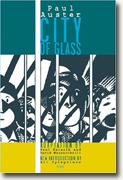City of Glass
Paul Auster et al.
book reviews:
· general fiction
· chick lit/romance
· sci-fi/fantasy
· graphic novels
· nonfiction
· audio books
· author interviews
· children's books @
curledupkids.com
· DVD reviews @
curledupdvd.com
newsletter
win books
buy online
links
home
for authors
& publishers
for reviewers

 |
City of Glass: The Graphic Novel story by Paul Auster graphic adaptation by Paul Karasik & David Mazzucchelli Picador Paperback 144 pages August 2004 |
|
“It was a wrong number that started it…” Quinn, a lonely, disaffected writer, is awakened one night by a phone call asking for Paul Auster of the Auster Detective Agency. Although he brushes off the initial call, he begins to reflect on the detective novels he writes under a pseudonym. Inspired by the spirit of Max Power, the narrator of his books, Quinn claims to be Auster the next time the unknown caller asks for the detective.
Peter Stillman, Sr., is about to be released from prison, and Peter’s wife wants a detective to keep him safe from this insane man. Quinn agrees to take the case, slipping into the character of Max Power to secure a retaining fee. He begins his investigation by reading the elder Stillman’s language research and finds that he believes in the possibility of creating a modern day Tower of Babel to return to language in its purest form. Quinn devotes himself to following Stillman around New York City, chronicling the man’s strange behavior. While ostensibly engaging in detective work, Quinn becomes part of a discourse on the nature of language. In the end, he gets close to his subject, but only succeeds in losing himself. While the plot of City of Glass is excellent, the illustrations serve to both complement and deepen it. The black and white artwork begins as an apparent homage to film noir, but quickly creates its own presence. During Quinn’s meeting with Peter Stillman, his strange disconnected voice is seen coming from deep within himself and eventually emanating from objects as diverse as a sink drain and an ink well. While Peter’s strangeness is apparent from his syntax and diction, the extended sequence adds layers of meaning to the scene. On a smaller scale, at a moment when Quinn is said to be losing touch with reality, a crisp black and white illustration suddenly blurs for a panel. Ultimately, though, it is difficult to put into words the nuances that make this an outstanding artistic work. City of Glass needs to be viewed to be appreciated. City of Glass was actually first published in 1994, earning a spot on The Comics Journal’s list of the hundred best comics of the century. Art Spiegelman contributes an introduction to the reprint, offering some insight into the creative process behind the project. For those unfamiliar to the world of graphic novels, this is a close equivalent to Stephen King lending his stamp of approval to a new horror novel, or John Grisham providing the introduction to a collection of courtroom stories. City of Glass certainly proves itself worthy of these honors. In the ten years since its first publication, graphic novels have found wider acceptance as literature, making this an ideal time for the book to be introduced to a welcoming new audience. However, this would also be a worthy read for those unfamiliar with the world of graphic novels, even those who perhaps think disparagingly of Garfield and Batman when they think of comics. City of Glass is worthy of recognition in both the worlds of “comics” and “literature". Originally published on Curled Up With A Good Book at www.curledup.com. © Lorie Witkop, 2004 |
| Also by Paul Auster: |
|
|
|
 Click here to learn more about this month's sponsor! |
|
| fiction · sf/f · comic books · nonfiction · audio newsletter · free book contest · buy books online review index · links · · authors & publishers reviewers |
|
| site by ELBO Computing Resources, Inc. | |
 The wrong number turns out to be Peter Stillman, a man who speaks with a strange cadence and style, possibly mixing truth and fiction. Peter was irreparably harmed by his father’s linguistic research. Believing that his son would learn to speak the language of God if he was kept from ever learning everyday language, for nine years Peter’s father beat him every time he spoke. Eventually, Peter’s father was sentenced to jail, and Peter recuperated in an institution.
The wrong number turns out to be Peter Stillman, a man who speaks with a strange cadence and style, possibly mixing truth and fiction. Peter was irreparably harmed by his father’s linguistic research. Believing that his son would learn to speak the language of God if he was kept from ever learning everyday language, for nine years Peter’s father beat him every time he spoke. Eventually, Peter’s father was sentenced to jail, and Peter recuperated in an institution.